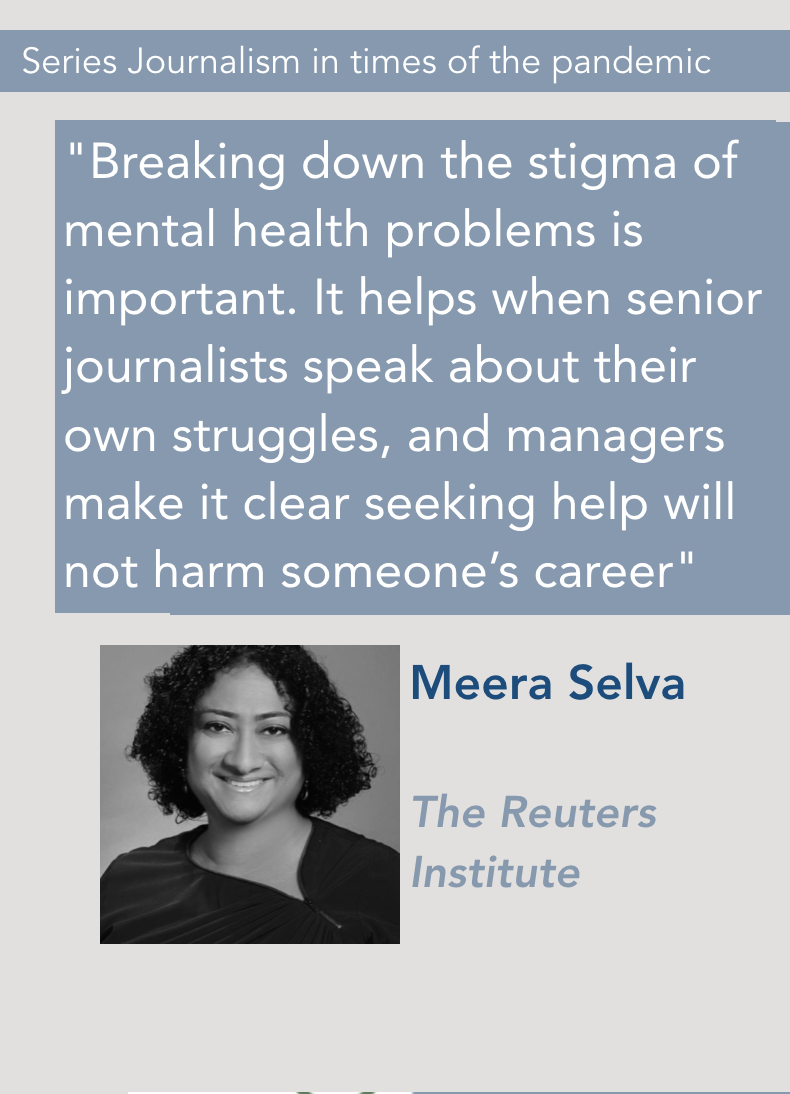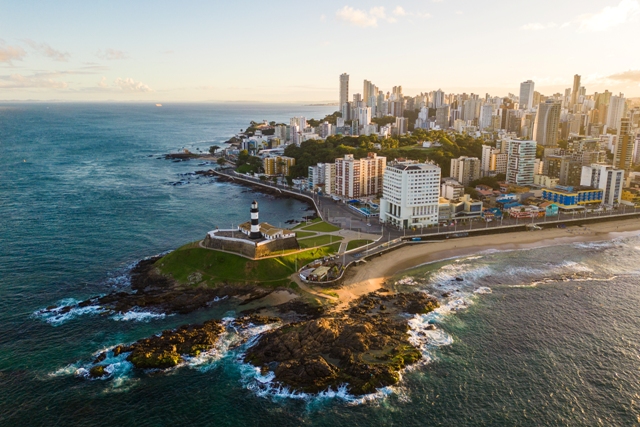By Luciana Gurgel | MediaTalks, London
In June, six months after the pandemic started to spread across the world, the Reuters Institute for the Study of Journalism (University of Oxford) decided to release the preliminary results of a survey into the state of journalists’ emotional wellbeing.
” The top-line findings are so striking that we feel it is important to flag up the pressure many journalists are working under so that news media and others can consider how to respond to the problems we identify” , said Meera Silva Director of Fellowship Journalism Program, who led the study with Dr. Anthony Feinstein, Professor of Psychiatry at the University of Toronto and a neuropsychiatrist.
Yet direct comparisons can be tricky given demographic mismatch, journalists still appear to be under higher than average strain, as she stressed. The research found that that a significant number of media professionals reporting on Covid-19 show signs of anxiety and depression, including experienced reporters working for large, well-funded media organizations:
-
- The majority of respondents, around 70 percent, suffer from some levels of psychological distress and responses suggest that 26 percent have clinically significant anxiety compatible with the diagnosis of Generalized Anxiety Disorder which includes symptoms of worry, feeling on edge, insomnia, poor concentration and fatigue.
-
- Around 11 percent of respondents report prominent symptoms of post-traumatic stress disorder, which include recurrent intrusive thoughts and memories of a traumatic COVID-19-related event, a desire to avoid recollections of the event, and feelings of guilt, fear, anger, horror and shame.
The researcher said to MediaTalks that several news organisations are already doing very good work, offering counselling and framing debates on the issue. But she reminds that some may not feel like discussing if they are unsure about how widespread these problems are in the profession.
“Breaking down the stigma is important. It really helps when senior and respected journalists speak about their own struggles, and managers make it clear seeking help will not harm someone’s career”
In June, when the survey was carried out, Our respondents say that their organizations have been moderately supportive. On average, our respondents give their organization a score of 6/10 where 10 was very supportive and 0 was not supportive at all. Similarly, they regard their work during the pandemic as moderately stressful and rate it as 6/10.
She explained that yet direct comparisons can be tricky given demographic mismatch but journalists still appear to be under higher than average strain. And that women – 58% of the sample – suffer more than men:
“In keeping with previous studies, there is more anxiety, PTSD symptoms and depression in female journalists, as opposed to male journalists”.
As working from home seems to be here to stay, Meera Selva raised some key elements that should be taken into account in order to avoid the effects of isolation:
“The ability to switch off from work, employers understanding competing demands at home, access to therapy and counselling are all important”.
Asked if the threats to press freedom were also identified as a reason for distress, she confirmed:
“Yes, as journalists report not being able to report accurately and openly, as they are denied access to information, or working in places where laws make it hard for them to openly question or criticise authority”.
The report highlights that in many countries journalists said they fear they are unable to do their job properly, in the absence of reliable information. One respondent wrote: “I am more stressed out because I am unable to cover the outbreak in my country as other countries in the west have done. I feel like a hypocrite because I am only allowed to follow what the government tells me to and I am not able to shed light on how the rest of the country is handling this outbreak.”

About the study
The Reuters Institute explained that the research builds on work Dr. Feinstein has done on how journalists are affected when they report on extreme events, including the 9/11 terror attacks, the Iraq war, organised crime in Mexico, the al-Shabaab attack on the Westgate Mall in Kenya, and. in a previous collaboration with the Reuters Institute, the refugee crisis in Europe.
The key points:
- It surveyed a sample of 73 journalists from international news organisations, who in June 2020 were asked to answer a set of questions on their working conditions and emotional state. All journalists have worked on stories directly related to the pandemic. The survey had a 63 percent response rate.
- This is a sample of experienced reporters, working at large, established news media, with an average of 18 years of experience, and virtually all – 99 percent – consider themselves to be in good physical health, but they are still hit hard by the circumstances. The situation could well be even worse in less privileged parts of the journalistic profession.
- Only 4 percent of respondents were specialist health reporters to begin with, but now 74 percent say they were reporting on health-related matters linked to the pandemic.
- While only one of the journalists surveyed tested positive for COVID-19, 45 percent of the sample know a journalist who had taken ill from the disease. Two respondents said they know of a journalist who had died from the virus.
- Working patterns have also changed. Sixty percent report working longer hours since the pandemic and 60 percent noted more demand for stories because of the pandemic.
- There is a negative correlation between covering the COVID-19 pandemic and age. Thus, the older you are, the less likely you were to be given a coronavirus story. This may well reflect a concern on the part of news organizations that older people are more vulnerable to the effects of the infection and as such, younger journalists were more likely to be given COVID related stories. If this is indeed the case, and it is hard to interpret the data any other way, it does reflect sensitivity on the part of news organizations to the wellbeing of their staff.
-
Fifty-two percent of respondents have been offered access to some form of counselling since the outbreak of the pandemic and the survey shows that those who have received therapy since the start of the pandemic are less likely to be anxious, distressed or display symptoms of PTSD.
-
Preliminary analysis suggests that psychological distress correlates significantly with the absence of counselling, so those journalists who did not receive counselling since the start of the pandemic are more distressed.
The Reuters Institute has polled journalists who are employed by established media houses, and the authors recognise there are many journalists working as freelancers, or for much smaller, poorly resourced newsrooms which are not in a position to offer any sort of extra support for their staff.
Luciana Gurgel is a Brazilian journalist based in London. She begun her editorial career at O Globo, one of the leading Brazilian media organisations. Later she founded (along with Aldo de Luca) Publicom, a successful corporate communications agency, acquired in 2016 by Golin + Weber Shandwick (IPG Group). In London, she has been working as news correspondent for Brazilian media – MyNews Channel, J&Cia – to which she writes a weekly column on trends and issue related to the news industry. The column originated a separate platform, MediaTalks, headed by Luciana from London as Editor-in-Chief.
This article is part of our series on the effects of the pandemic on journalism













